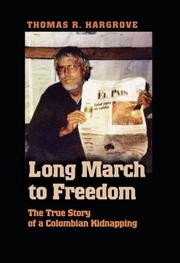| Listing 1 - 10 of 19 | << page >> |
Sort by
|
Book
ISBN: 1420080075 0429249829 9786611994082 1281994081 1420080083 9781420080087 9781420080070 9781281994080 9780429249822 6611994084 1040082203 Year: 2009 Publisher: Boca Raton, FL CRC Press
Abstract | Keywords | Export | Availability | Bookmark
 Loading...
Loading...Choose an application
- Reference Manager
- EndNote
- RefWorks (Direct export to RefWorks)
The enormous sums paid for the release of hostages coupled with law enforcement 's inability to stem the tide has made kidnapping for ransom a worldwide plague. The increasing rate of reported incidents from every corner of the globe suggests this plague is growing. Kidnap for Ransom: Resolving the Unthinkable removes the veil of mystery and dispels some of the myths surrounding kidnapping. The book provides security professionals, families, and law enforcement personnel with the modern tools needed to understand and effectively respond to the crime of kidnapping. This volume traces the histor
Kidnapping --- Abduction of children --- Child abduction --- Child snatching --- Kidnaping --- Offenses against the person --- History.

ISBN: 1281272841 9786611272845 0080559301 0123740312 9780123740311 9780080559308 9781281272843 6611272844 Year: 2008 Publisher: Amsterdam ; Boston : Elsevier/Academic Press,
Abstract | Keywords | Export | Availability | Bookmark
 Loading...
Loading...Choose an application
- Reference Manager
- EndNote
- RefWorks (Direct export to RefWorks)
Kidnapping: An Investigator's Guide to Profiling is based on a three-part analysis of 100 randomly selected kidnapping cases prosecuted in the United States that have survived Supreme Court appeal. The results of the analysis are incorporated into each chapter as part of the exploration of the inductive profile of each subtype, thereby offering a statistically based tool that can inform investigative strategies and the allocation of limited resources. The analysis includes standardized input from four levels of professional law enforcement including a forensic psychologist, a crime ana
Kidnapping --- Abduction of children --- Child abduction --- Child snatching --- Kidnaping --- Offenses against the person
Book
ISBN: 0817387455 9780817387457 9780817318222 0817318224 Year: 2014 Publisher: Tuscaloosa
Abstract | Keywords | Export | Availability | Bookmark
 Loading...
Loading...Choose an application
- Reference Manager
- EndNote
- RefWorks (Direct export to RefWorks)
Informed by thousands of pages of newly released FBI files, The Kidnapping and Murder of Little Skeegie Cash tells the gripping story of the only crime investigated by J. Edgar Hoover himself, the sensational 1938 murder of a five-year-old boy from the Florida Everglades.In his long and storied career, J. Edgar Hoover investigated only one case personally, the 1938 kidnapping and murder of five-year-old Floridian James "Skeegie" Cash. What prompted the director himself to fly from Washington, DC, to a rain-drenched hamlet on the edge of the Everglades? Congress had slashed
Murder --- Kidnapping --- Criminal homicide --- Killing (Murder) --- Homicide --- Abduction of children --- Child abduction --- Child snatching --- Kidnaping --- Offenses against the person --- Investigation --- History. --- McCall, Franklin Pierce. --- Cash, James Bailey,

ISBN: 129905319X 1603444572 9781603444576 9781585446322 1585446327 0345405080 9780345405081 9781299053199 Year: 2007 Publisher: College Station : Texas A & M University Press,
Abstract | Keywords | Export | Availability | Bookmark
 Loading...
Loading...Choose an application
- Reference Manager
- EndNote
- RefWorks (Direct export to RefWorks)
Running late for work one morning in September 1994, Tom Hargrove, communications director for an international agricultural aid organization in Cali, Colombia, was mildly annoyed when he spotted a roadblock, or retén, manned by soldiers in fatigues. He chafed at the delay, but told himself that guerrillas and kidnappers didn't operate on a main highway in broad daylight. But Hargrove had been dreadfully mistaken. Despite his assertions that he worked for a non-profit agricultural agency, he was forced at gunpoint into a vehicle and driven into the mountains by communist narco-terrorists who believed he was a valuable hostage. For almost a year, Hargrove was held by the guerillas and moved from one remote location to another. To maintain his grip on sanity, he recorded his daily experiences in makeshift journals: in a checkbook; on children's notebooks; and on scraps of paper scrounged during his ordeal. Hargrove's story, originally published in 1995, was the basis for the major motion picture Proof of Life, starring Russell Crowe and Meg Ryan. Now available again in paperback, Long March to Freedom chronicles one man's spirited determination to hang onto life and faith amid nearly impossible circumstances.
Kidnapping --- Abduction of children --- Child abduction --- Child snatching --- Kidnaping --- Offenses against the person --- Hargrove, Thomas R. --- Hangrove, R.R. --- Kidnapping, 1994.
Book
ISBN: 162922085X 1629220868 9781629220857 9781629220864 9781629220840 1629220841 Year: 2018 Publisher: Akron, Ohio
Abstract | Keywords | Export | Availability | Bookmark
 Loading...
Loading...Choose an application
- Reference Manager
- EndNote
- RefWorks (Direct export to RefWorks)
Kidnapping --- Abduction --- Missing persons --- Anonymous persons --- Women --- Grief --- Unidentified persons --- Unknown persons --- Persons --- Abduction of children --- Child abduction --- Child snatching --- Kidnaping --- Offenses against the person
Book
ISBN: 0124080537 0124080650 1299738915 9780124080652 Year: 2013 Publisher: London : Elsevier,
Abstract | Keywords | Export | Availability | Bookmark
 Loading...
Loading...Choose an application
- Reference Manager
- EndNote
- RefWorks (Direct export to RefWorks)
Kidnapping: An Investigator's Guide to Profiling is based on a three-part analysis of 100 randomly selected kidnapping cases prosecuted in the United States that have survived Supreme Court appeal. The results of the analysis are incorporated into each chapter as part of the exploration of the inductive profile of each kidnapping subtype, thereby offering a statistically based tool that can inform investigative strategies and the allocation of limited resources. The analysis includes standardized input from four levels of professional law enforcement including a forensic psychologist, a cri
Domestic kidnapping. --- Kidnapping -- History. --- Kidnapping -- United States. --- Kidnapping --- Social Welfare & Social Work --- Social Sciences --- Criminology, Penology & Juvenile Delinquency --- Abduction of children --- Child abduction --- Child snatching --- Kidnaping --- Offenses against the person --- Segrest --- Plagi (Segrest) --- Delictes contra la persona --- Dret penal --- Rapte
Book
ISBN: 1493921177 1493921169 Year: 2019 Publisher: New York, NY : Springer New York : Imprint: Springer,
Abstract | Keywords | Export | Availability | Bookmark
 Loading...
Loading...Choose an application
- Reference Manager
- EndNote
- RefWorks (Direct export to RefWorks)
This book analyzes kidnapping in various forms and from various perspectives. First it argues that kidnapping, including the threat of kidnapping, reflects a breakdown in the mechanisms of social control in society. This volume also discusses the ways governments and para-military and terrorist groups employ kidnappings as part of their foreign and domestic policy. This analysis evaluates why and under what conditions governments, para-military and terrorist groups decide to abduct individuals and groups. It emphasizes how individuals, groups, and governments employ abductions to achieve their psychological, social, religious, and political objectives. This analysis also examines the ways in which cultural traditions in different societies emerge to foster behaviors such as bride abductions. Moreover, this book addresses the extent to which social change modifies these cultural patterns. Suitable for students and researchers, mental health practitioners, and law enforcement, this volume is a unique analysis of our contemporary understanding of kidnapping and violence, and the social, psychological, political, and cultural motivations for such an act.
Kidnapping. --- Abduction of children --- Child abduction --- Child snatching --- Kidnaping --- Offenses against the person --- Psychic research. --- Psychology, clinical. --- Psychology Research. --- Clinical Psychology. --- Experiential research. --- Clinical psychology. --- Psychiatry --- Psychology, Applied --- Psychological tests --- Research
Book
ISBN: 1317157842 1317157834 1299407307 1409449920 9781409449928 9781409449911 1409449912 9781409449911 9781317157830 9781299407305 9781317157847 9781315574837 9781317157823 9780815362159 1315574837 Year: 2013 Publisher: Farnham, Surrey
Abstract | Keywords | Export | Availability | Bookmark
 Loading...
Loading...Choose an application
- Reference Manager
- EndNote
- RefWorks (Direct export to RefWorks)
By focussing on kidnappings that are putatively connected to the struggle for emancipating the Niger Delta, Oriola makes the case for analysing the Movement for the Emancipation of the Niger (MEND) as a social movement organization, rather than a terrorist or criminal gang by showing how political processes shape kidnappings in the Delta. The use of violent repertoires of contention has not garnered sufficient attention in the social movement literature, despite the fact that that around the world, many similar groups are adopting violent tactics without necessarily eschewing non-violent techn
Kidnapping --- Petroleum industry and trade --- Political violence --- Violence --- Political crimes and offenses --- Terrorism --- Energy industries --- Oil industries --- Abduction of children --- Child abduction --- Child snatching --- Kidnaping --- Offenses against the person --- Political aspects --- Nigeria --- Politics and government
Book
ISBN: 0809387492 1435663497 9781435663497 9780809387496 Year: 2007 Publisher: Carbondale : Southern Illinois University Press,
Abstract | Keywords | Export | Availability | Bookmark
 Loading...
Loading...Choose an application
- Reference Manager
- EndNote
- RefWorks (Direct export to RefWorks)
Murder --- Kidnapping --- Trials (Murder) --- Murderers --- Criminology, Penology & Juvenile Delinquency --- Social Welfare & Social Work --- Social Sciences --- Homicide offenders --- Killers (Murderers) --- Murder offenders --- Criminals --- Murder trials --- Abduction of children --- Child abduction --- Child snatching --- Kidnaping --- Offenses against the person --- Criminal homicide --- Killing (Murder) --- Homicide --- History --- Leopold, Nathan Freudenthal, --- Loeb, Richard A., --- Franks, Bobby, --- Franks, Robert, --- Loeb, Dickie, --- Leopold, Babe,
Book
ISBN: 1469640597 1469640600 1469640589 1469659166 9798890852694 9781469640594 9781469640600 9781469640587 Year: 2018 Publisher: Williamsburg, Virginia Chapel Hill
Abstract | Keywords | Export | Availability | Bookmark
 Loading...
Loading...Choose an application
- Reference Manager
- EndNote
- RefWorks (Direct export to RefWorks)
"What frustrated Washington was his ongoing failure to induce Indians north of the Ohio to cede their lands ... Washington had sought to pacify the Indians by abandoning the doctrine of discovery and reimbursing them for their lands. But they continued to refuse to come to the treaty table, condemned further land cessions north of the Ohio, and formed the first northwestern Indian confederacy to oppose intrusion on their homelands ... Washington had to find other means to undercut Indian resistance. Those means involved razing villages, destroying the crops, and taking hostage the women and children the warriors were trying to protect ... Washington ordered the Kentucky militia to cut a wide swath of terror though agrarian communities clustered along the Wabash. Those villages, primarily populated by women, served as the breadbasket for Indian forces. Washington believed that the destruction of these communities and the kidnapping of their women and children would force those warriors to return to their villages and abandon their resistance to Washington's forces. He had done it successfully to the Seneca during the Revolutionary War, and he planned to do it again"--Introduction.
Kidnapping --- Indian women --- Indians, Treatment of --- Indians of North America --- Women, Indian --- Women --- Abduction of children --- Child abduction --- Child snatching --- Kidnaping --- Offenses against the person --- American aborigines --- American Indians --- First Nations (North America) --- Indians of the United States --- Indigenous peoples --- Native Americans --- North American Indians --- Indians --- History. --- History --- Government relations. --- Culture --- Ethnology --- Government relations --- United States
| Listing 1 - 10 of 19 | << page >> |
Sort by
|

 Search
Search Feedback
Feedback About UniCat
About UniCat  Help
Help News
News